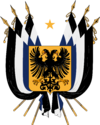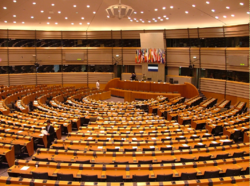Federal Assembly of Vierzland
This article is incomplete because it is pending further input from participants, or it is a work-in-progress by one author. Please comment on this article's talk page to share your input, comments and questions. Note: To contribute to this article, you may need to seek help from the author(s) of this page. |
Federal Assembly Bundesversammlung | |
|---|---|
 | |
| Type | |
| Type | |
| History | |
| Established | 4 January 1992 |
| Preceded by | Imperial Council (1766–1990) Reichsthing (1828–1990)
|
| Leadership | |
President of the Federal Assembly | |
Leader of the Federal Assembly | |
| Structure | |
| Seats | 745 |
 | |
Political groups | Government (448)
Opposition (297)
|
| Elections | |
| Mixed-member proportional representation (MMP) | |
Last election | 14 January 2017 |
Next election | 15 January 2022 |
| Meeting place | |
 | |
| Federation Palace Adtrus, Vierzland | |
| Website | |
| www.bv.vz | |
 |
|---|
| This article is part of a series on the politics and government of Vierzland |
The Federal Assembly of Vierzland (Vierz: Bundesversammlung Vierzland), officially the Federal Assembly of the Vierz Federation (Vierz: Bundesversammlung der Vierzischen Föderation), is the federal, unicameral legislature of Vierzland. The legislature has 745 members elected by mixed-member proportional representation under universal suffrage for all citizens 18 years of age or older. Elections have fixed-terms of five years and occur on the second Saturday of January, but spontaneous elections can be called by a 2/3 vote of the assembly.
The Federal Assembly was created under Chapter II of the Constitution of Vierzland, with its first elections held in 1992. It is situated in Adtrus in the Palace of Honour, which housed the Reichsthing from 1857 to 1990. The Federal Assembly is led by a President and any number of Vice Presidents, who are elected by a simple majority on the day of a new legislature's inauguration.
Since the abolition of the presidency in 1998, solely the Federal Assembly elects the Chancellor, which occurs directly thereafter the inauguration of a new legislature. Every chancellor since 1992 has also been the leader of the largest party in the Federal Assembly, although this is not constitutionally mandated.
With the establishment of an entirely parliamentary system in 1990, the Federal Assembly has seen a plurality of parties represented. Currently, there are six parties with seats in the legislature.
History
Latest election
Elections
Structure
President
The President of the Federal Assembly (Präsident der Bundesversammlung) is the speaker of the legislature. The President is second or third in the order of precedence, taking their position behind the Chancellor, and the Deputy Chancellor if applicable.
The role of the President is to moderate debate, make rulings on procedure, announce the results of votes, and generally manage the assembly as a whole. They are elected by simple majority vote of the assembly on the day of its inauguration. The President is required to maintain at least one Vice President.
The President since 16 February 2012 is Eva Weiskopf of the National Democratic Party.
Leader
The Leader of the Federal Assembly (Leiter der Bundesversammlung) is the leader of the majority party or majority coalition's parliamentary group in the assembly. They are responsible for representing the executive branch and its legislative aims in the assembly, as well as acting as a whip for party members. The Leader and their deputies, if applicable, are cabinet-level officials.
The leader is elected the day of the assembly's inauguration, and may serve with no or any number of deputies. The incumbent leader since 16 February 2012 is Tilman Kohl of the National Democratic Party.
